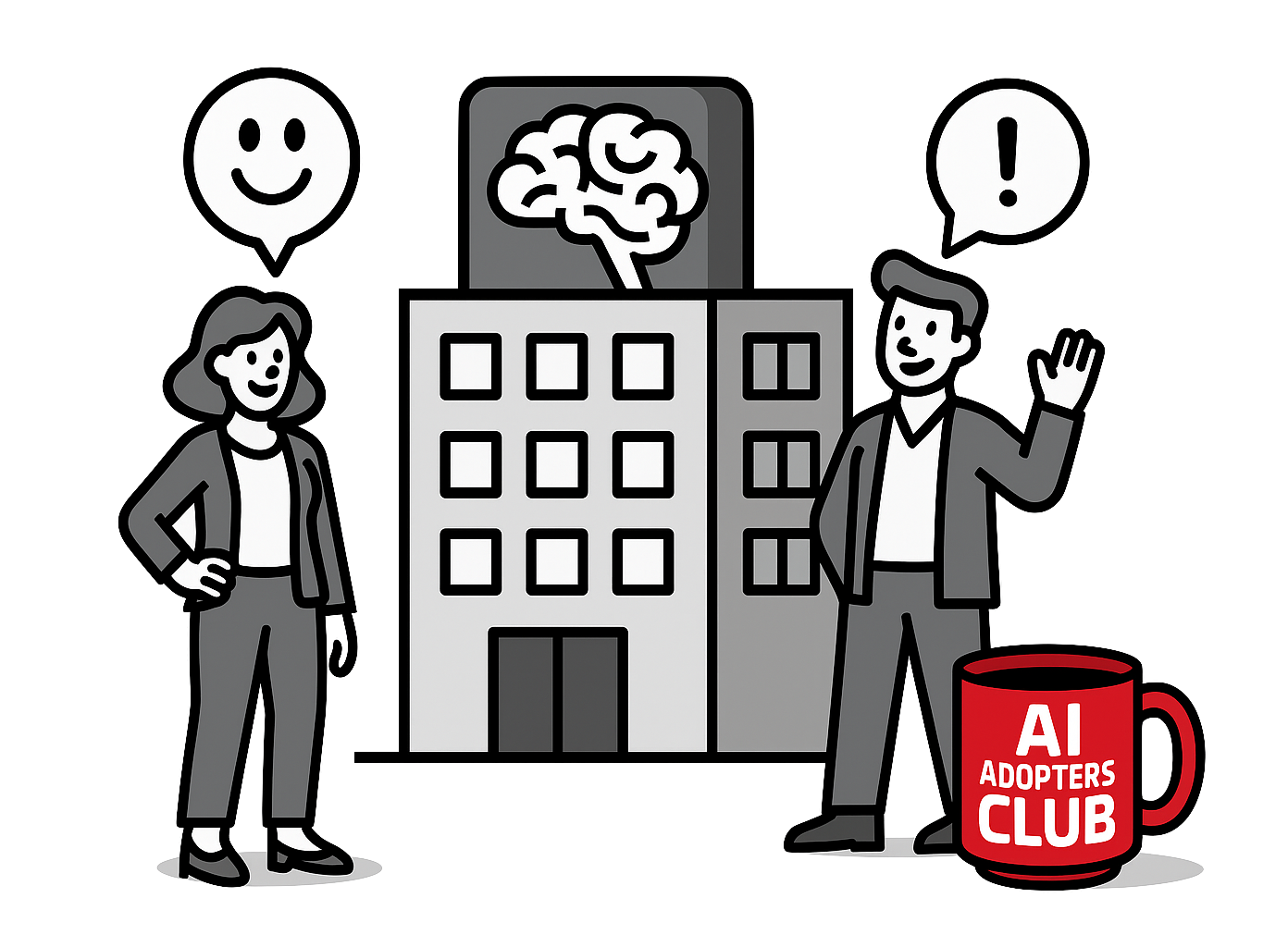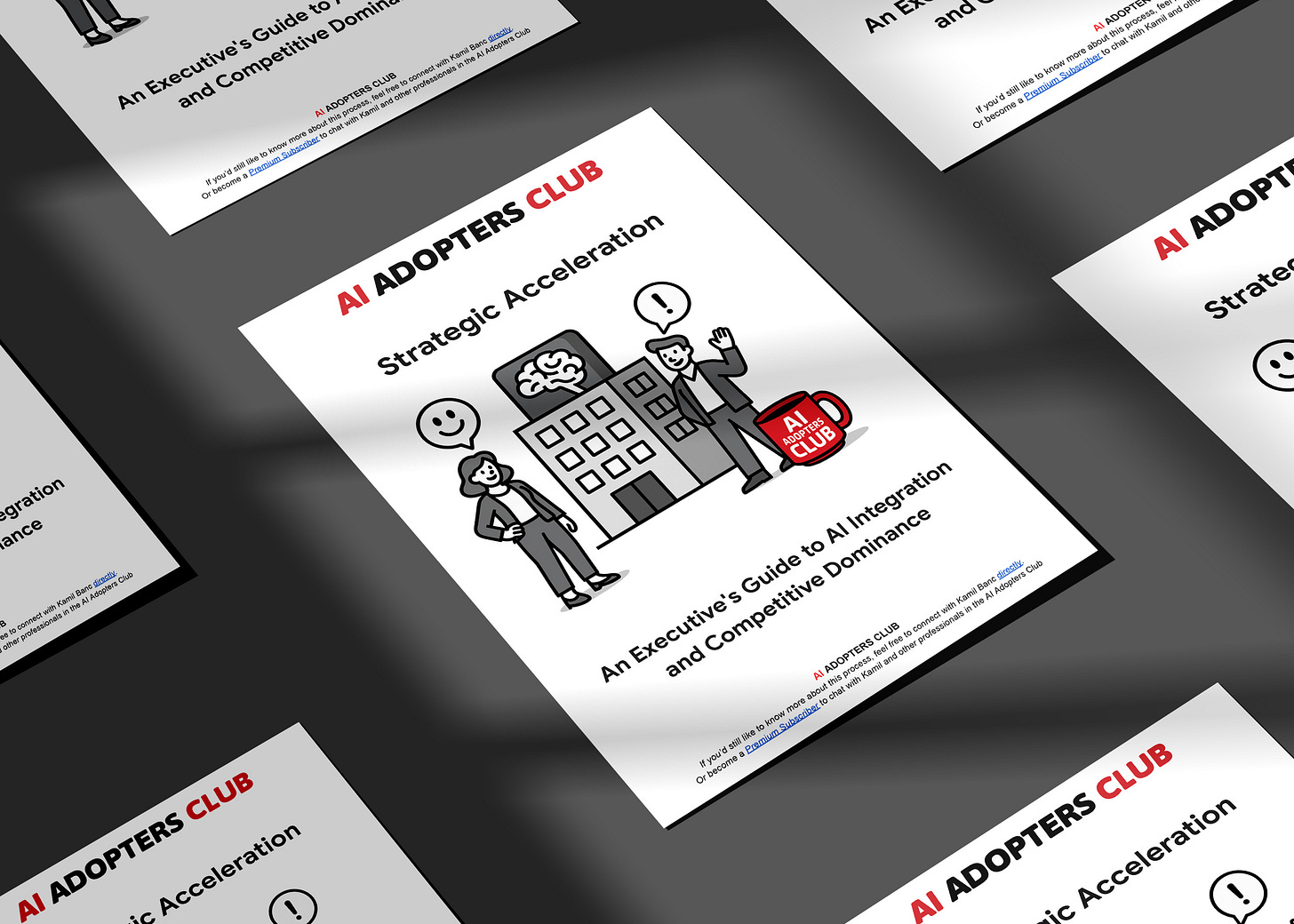Your Company Data is Leaving the Building Every Day
OpenAI's GPT-OSS lets you run powerful AI privately on your servers. No monthly fees, no data sharing, full control. Here's how to start.
Hey Adopter,
OpenAI just flipped the script on enterprise AI.
Yesterday, they quietly released GPT-OSS, their first open-weight models that you can download, modify, and run entirely on your own servers. No API calls. No data leaving your building. No monthly subscription fees eating into your budget like that overpriced coffee machine in the break room.
This changes everything about how companies can use AI.
By the end of this newsletter, you'll understand why this matters for your business, how to evaluate if private AI deployment makes sense for your organization, and what security considerations you can't afford to ignore. Plus, I'll reveal exactly what's inside my Strategic Acceleration report that's helping Fortune 500 companies build their AI competitive advantage.
If your company makes $10M+ and you're serious about AI, let's talk. I work with leadership teams to implement proven, tailored strategies—no junior consultants or generic frameworks. Reach out to see if your organization is ready for this transformation.
The news nobody's talking about (because they're too busy chasing shiny objects)
While everyone was busy debating whether AI will take their jobs, OpenAI dropped two new models: gpt-oss-120b and gpt-oss-20b. Both use mixture-of-experts architecture with 4-bit quantization. Translation for normal humans: they're fast and efficient enough to run on the servers you already have.
The bigger model runs on a single 80GB GPU. The smaller one? It works on consumer hardware with just 16GB of memory. That gaming laptop your IT department said was "overkill"? Turns out it's perfect.
Here's the kicker. These models come with an Apache 2.0 license. You can use them commercially, modify them however you want, and never tell anyone what you're doing with them. It's like OpenAI just handed you the keys to the castle and walked away.
Dell, Microsoft, and Databricks already have these models integrated into their platforms. They saw what most companies are too distracted to notice.
Your data is leaving the building (and you're acting like it's fine)
Every time your team sends a prompt to ChatGPT's API, that data travels to OpenAI's servers. Sure, they have privacy policies. Yes, they're probably secure. But "probably" isn't a strategy when you're dealing with:
Financial projections before earnings calls
Customer data subject to GDPR or HIPAA
Proprietary code that represents years of R&D
Strategic plans your competitors would pay seven figures to see
Companies self-hosting GPT-OSS maintain complete data sovereignty. Your sensitive information never crosses your network boundary. Your trade secrets stay secret. Your compliance officer finally gets a good night's sleep.
But if you think data privacy is the biggest win here, you're thinking too small.
The advantage hiding in plain sight
When you control the model, you control the game.
You can fine-tune GPT-OSS with your own data, creating AI systems that understand your industry's jargon, your company's processes, and your customers' specific needs. Not generic responses. Not "close enough" answers. Exact, precise, proprietary intelligence.
Imagine a model that knows your product catalog better than your best salesperson. One that writes technical documentation using your exact terminology. One that understands your customers' pain points because it's been trained on five years of support tickets.
Your competitors using generic ChatGPT? They're bringing a Swiss Army knife to a surgery.
The cost structure changes too. No more surprise bills when someone accidentally runs a massive batch job. No API rate limits shutting down your project at the worst possible moment. You pay once for hardware and control your destiny.
Security theater versus actual security
Running AI in-house doesn't automatically make it secure. It makes you responsible for security. Big difference.
The fundamentals remain non-negotiable: encrypt everything in transit using TLS 1.3, encrypt everything at rest with AES-256, implement zero-trust architecture. Basic stuff that half of you still aren't doing properly.
But here's what the consultants charging you $5,000 a day won't tell you. You need to defend against AI-specific attacks. Prompt injection attacks that turn your helpful assistant into a data-leaking liability. Adversarial inputs designed to extract training data. Model manipulation through coordinated query patterns.
Smart companies are implementing human-in-the-loop oversight for critical decisions. Because an AI hallucination behind your firewall is still a hallucination. It's just a private one.
The early adopters aren't waiting for permission
Healthcare companies use private GPT-OSS for clinical decision support. Patient data never leaves their HIPAA-compliant infrastructure. They're not asking if it's possible. They're already doing it.
Financial services firms run risk analysis and compliance monitoring without exposing transaction data to third parties. Legal teams analyze contracts using models trained on their specific precedents.
These organizations made a simple calculation. The control, security, and customization benefits outweigh the complexity of self-hosting. They're not adopting AI. They're building competitive moats.
I've compiled the exact playbook that Fortune 500 companies use to deploy AI without the usual disasters. This isn't theory—it's stolen from their war rooms.
Get the insider tactics that deliver $3.50 for every $1 invested:
The bulletproof 6-phase rollout that prevents the "pilot purgatory" killing 73% of AI projects
Executive objection scripts - Word-for-word responses when your CFO says "too expensive" or legal says "too risky"
61 documented failure points so you avoid the million-dollar mistakes others made first
Department-by-department playbooks with before/after numbers from real companies (finance saved 40% on reporting time, marketing boosted conversions 23%)
The "Dave from accounting" problem solver - Change management tactics that turn skeptics into champions
Board presentation template that gets unanimous approval (includes the 5 questions directors always ask)
The integration blueprint that changes everything
Getting GPT-OSS running in your environment requires more than IT support. It requires strategy.
Microsoft Azure AI Foundry and Databricks offer native support, but choosing the right platform depends on your existing infrastructure. The companies succeeding aren't picking tools. They're building ecosystems.
The real implementation challenges aren't technical. Your IT team worries about another system to maintain. Your legal team questions liability. Your CFO sees upfront costs without understanding that you're currently bleeding money through API fees and lost productivity.
Here's exactly how to navigate each objection, build consensus, and move from pilot to production...






